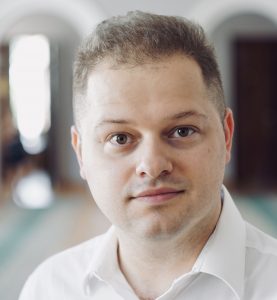 Dmytro Vovk, Director of the Center for the Rule of Law and Religion Studies at Yaroslav Mudryi National Law University and co-editor of Talk About: Law and Religion
Dmytro Vovk, Director of the Center for the Rule of Law and Religion Studies at Yaroslav Mudryi National Law University and co-editor of Talk About: Law and Religion
In October 2020, Fratelli tutti, Pope Francis’s new encyclical was released. This 287-paragraph document provides a Catholic perspective on a variety of questions from human dignity and political integration from the lack of public trust and peacemaking to the death penalty and fake news. Talk About: Law and Religion posts a series of theological and philosophical reflections on Fratelli tutti.
Thomas Massaro explains the genre of social encyclicals,into which Fratelli tutti falls, its historical and doctrinal contexts, main topics, and aims. Greg Marcar traces “one way in which Pope Francis’ … encyclical takes us from the parable of the Good Samaritan in Luke 10 to an understanding of being human based upon universal love, and finally towards an obligation on all countries to welcome the other in their midst.”
Minakov’s and Domingo’s posts focus on the “fraternal” integrational political project shaped in the encyclical and its call for an open and morally mature society. Domingo points out that “in a world viewed from this new fraternal perspective, it would no longer be possible to hide behind state interests, justify wars, legitimize the death penalty, or arbitrarily close borders to our brothers pleading for our assistance.” Minakov concludes that “the normative horizon of universalism is definitely getting new inspiration from the ideas, arguments, and conclusions of the Fratelli tutti encyclical. And these should not remain unappreciated by those in secular universalist circles.”
Montserrat Gas-Aixendri explores religious peacebuilding in Fratelli tutti. According to Gas-Aixendri, the encyclical addresses three important issues regarding the relationship between religions and peace: (1) the roots of violence falsely linked to religion; (2) religious values of authentic peace; (3) interlinks between the contribution of religious communities to peace and respect for religious freedom and the boost of interreligious dialogue.
Finally, Patrick Hornbeck reflects on truth, trust, political unity, and social and political skepticism in the encyclical. According to Hornbeck, “the document is a moving one precisely because it is not a policy platform or a doctrinal definition. Instead, it is a timely restatement—an aggiornamento, to use the language of the Second Vatican Council—of core Christian beliefs about the love of one’s neighbor in a time of profound upheaval and conflict.” Hornbeck adds that “determining what is real and what is true may be a painful and terrifying process, but the pontiff is right: it is the only way forward.”
Posts in the Series:
Thomas Massaro. The Renewal of Catholic Social Concerns in Fratelli tutti
Greg Marcar. Universal Love and Borderless Rights: Attending to Our Neighbour with Pope Francis and the Good Samaritan
Mikhail Minakov. Universalist Response to Particularistic Regression: Political Philosophy behind the Pope Francis Encyclical Fratelli tutti
Rafael Domingo. Fratelli tutti: A Marvelous Gift of Pope Francis
Montserrat Gas-Aixendri. Religious Peacebuilding in Fratelli tutti
Patrick Hornbeck. Pope Francis’s Politics of Love
